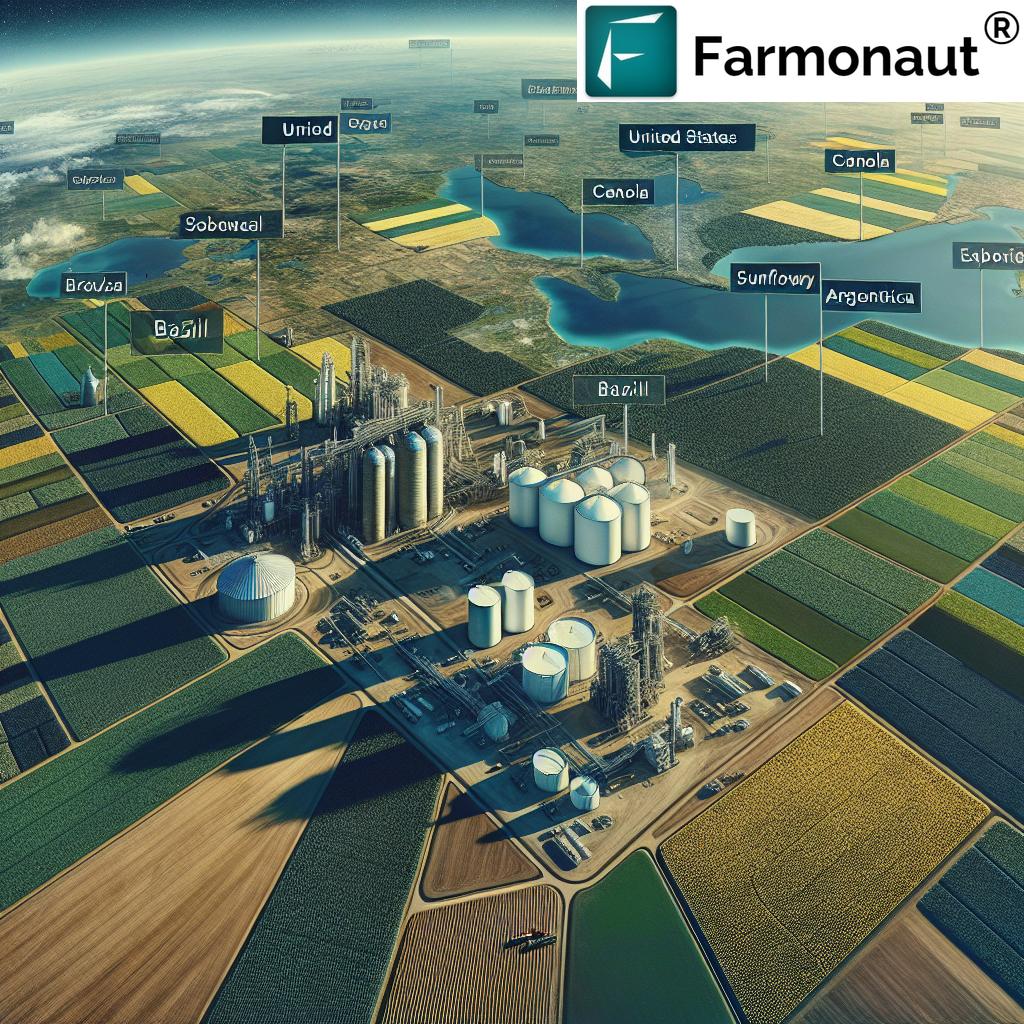Oilseeds Market 2024: Shocking Global Trends Revealed
- Market Overview
- Oilseeds Market Trivia
- Key Oilseed Types and Their Global Influence
- Regional Analysis: Leaders and Shifts in Oilseed Production
- Oilseeds Market Dynamics: What’s Driving Demand?
- Global Oilseeds Market Trends Comparison Table
- Innovations & Technologies in Oilseed Processing
- Challenges Impacting the Global Oilseeds Market
- Farmonaut: Powering Precision Agriculture in the Oilseeds Industry
- Major Players in the Oilseeds Market
- Frequently Asked Questions (FAQ)
- Conclusion & The Road Ahead
“Global soybean production is projected to surpass 400 million metric tons in 2024, fueling edible oil and animal feed industries.”
Market Overview: The Pulse of the Global Oilseeds Market
As we step into 2024, the global oilseeds market stands as a keystone in the agricultural industry, deeply intertwined with food security, nutrition, and even global energy supply. Oilseeds—primarily including soybeans, rapeseed (canola), sunflower seeds, and peanuts—are driving new innovations and setting fresh benchmarks in production, processing, and consumption.
Valued at nearly USD 310.8 billion in 2024, the market is projected to reach USD 501.5 billion by 2034, with an annual growth rate of 4.9% (market.us). This surge is propelled by:
- Rising consumer demand for edible oils and plant-based products
- Increased animal feed usage owing to expanding livestock industries
- Escalating need for biofuels across developed and developing countries
- Technological advancements in seed processing technologies and precision agriculture
At the heart of this transformation are innovative companies, technology providers, and farmers who continually adapt to new trends, regulatory shifts, and market disruptions.
Key Oilseed Types and Their Global Influence
Let’s explore the top oilseed types shaping the global market:
Soybeans: The Oilseeds Market Dominator
- In 2024, soybean production seized a 58.4% market share (market.us).
- Soybeans are remarkably versatile, supporting oil extraction, animal feed (such as soy meal), biodiesel, and thousands of food products.
- Major producing countries include the United States, Brazil, Argentina, and China.
- Rising global edible oils demand and animal feed from oilseeds continues to place soybeans at the industry’s core.
Canola and Rapeseed Industry: A Fast-Growing Segment
- Rapeseed (including canola varieties) is celebrated for its high oil yield—predominantly in Europe, Canada, and Asia.
- Used in culinary applications, industrial products, and biofuels from oilseeds.
- Canola and rapeseed oil offer a healthier profile (low in saturated fats), driving their popularity in global cooking and industrial applications.
Sunflower Seed Oil Market: Quality & Innovation
- Sunflower seeds are prized for premium quality oil and supply essential animal feed.
- Especially significant in Eastern Europe (Ukraine, Russia), France, and Germany.
- Culinary innovation (e.g., cold-pressed, organic oils) fuels growth in edible oils demand.
Peanuts: Versatility in Oil and Food
- Peanut oil is in high demand for cooking (especially in Asia Pacific) and food product applications.
- While most peanuts are consumed as snacks, significant volumes support oil extraction and processed foods.
Palm and Other Oilseeds
- Palm oil (from the fruit of oil palm trees), although not always classed with the above seeds, remains a global leader in edible oils, biodiesel, and consumer products, especially in Southeast Asia and Africa.
- Emerging seeds—like cottonseed, sesame, and flaxseed—are carving special niches in health, textiles, and animal feed.
Oilseeds Market Trends: Key Takeaway
Our analysis confirms that soybean production, alongside canola, sunflower, and peanuts, commands the global oilseeds market due to their adaptability, technological investments, and broad usage in food, animal feed, and energy.
Regional Analysis: Leaders and Shifts in Oilseed Production
Regional forces in the oilseeds market not only impact trade flows but also set worldwide pricing and technology adoption trends.
Asia Pacific: Epicenter of Demand and Growth
- Asia Pacific leads with a 45% global share (fortunebusinessinsights.com).
- China is the powerhouse—consuming over 31.9 million metric tons to meet its vast food processing and animal feed requirements.
- India is a prominent producer and consumer, especially in peanuts and rapeseed sectors.
- The region’s population and rising living standards continue to boost edible oils demand.
North America: Innovation Hub for Soybean and Canola
- The United States and Canada together account for about 22% of global oilseed production (2023 figures, marketresearch.biz).
- The region specializes in soybean and canola, with rapid adoption of GM oilseed crops and state-of-the-art oilseed processing technologies.
- North America is a trend-setter in sustainable practices and the use of oilseeds for biofuels (notably, biodiesel).
Europe: Sustainable Production and Market Regulation
- With 18% of global oilseed production, France and Germany lead in rapeseed and sunflower output.
- Strong policies drive organic, non-GM, and sustainable supply chains; this aligns with heightened consumer demand for traceable and eco-friendly edible oils products.
South America: Bountiful Harvests and Global Exports
- Brazil and Argentina are the backbone of soybean exporting, with Brazil alone exporting around USD 39 billion worth in 2021.
- These countries continue to dominate in soybean and sunflower seed oil market—further enhanced by extensive agricultural land and technological improvements.
Oilseeds Market Dynamics: What’s Driving Demand?
The evolution of the oilseeds market is shaped by a combination of dietary transitions, industrial needs, and shifting consumer preferences.
Edible Oils Demand: Food Security & Nutrition at the Forefront
- Edible oils comprised 73.2% of the oilseeds market in 2024 (market.us).
- Plant-derived oils (soybean, sunflower, rapeseed/canola) dominate cooking, baking, and food processing in nearly every country.
- Growing health awareness is steering demand toward oils with favorable fatty acid profiles (e.g., canola and sunflower).
Animal Feed from Oilseeds: Sustaining Livestock and Poultry Sectors
- Oilseed meals (byproducts of oil extraction, such as soybean meal) are essential protein sources for animal feed industries.
- Feed demand is fuelled by increasing meat and dairy consumption, especially in Asia Pacific, North America, and South America.
Biofuels from Oilseeds: Powering Sustainable Energy
- Oilseeds (notably soybean, canola, and palm) are increasingly converted into biodiesel—a trend heightened by energy security initiatives and climate policies.
- Demand for biofuels from oilseeds is accelerating technology transfer and investment into oilseed processing facilities globally.
Technological Advancements: Enabling Competitive Yields and Sustainability
- Biotechnology, satellite-based precision agriculture (see Farmonaut), and engineered oilseed varieties are key to boosting crop yields and resource efficiency.
- Herbicide-tolerant oilseeds comprised 58.4% of the market in 2024, giving farmers new options for weed management and input savings.
- GM oilseed crops now own a 68.3% share of the global market, underscoring the value of science and innovation in agriculture.
These market drivers are regularly shaped by consumer perceptions, environmental sustainability efforts, and the innovative strategies of global companies and producers.
“Biofuel demand is set to drive a 15% increase in oilseeds processing technology investments worldwide this year.”
Global Oilseeds Market Trends Comparison Table
For a clear view of how major oilseeds are performing, here’s a comparison table covering their production volumes, growth rates, geographic leadership, application focus, and recent technological advancements.
| Oilseed Type | 2024 Estimated Production Volume (MMT) | Year-on-Year Growth Rate (%) | Major Producing Regions | Primary End Uses | Notable Technological Advancements |
|---|---|---|---|---|---|
| Soybeans | ~405 | 5.1 | USA, Brazil, Argentina, China | Edible oil, Animal feed, Biofuels | GM varieties, Precision agriculture, Satellite-based crop monitoring |
| Sunflower | ~54 | 4.3 | Ukraine, Russia, France, Germany, Argentina | Edible oil, Animal feed | Cold-pressing, Drought-tolerant hybrids |
| Rapeseed/Canola | ~77 | 4.5 | Canada, France, Germany, China, India | Edible oil, Animal feed, Biofuels | Herbicide-tolerant GM, High-oleic oil profiles |
| Palm | ~79 | 2.7 | Indonesia, Malaysia, Thailand, Nigeria | Edible oil, Biofuels, Industrial | Sustainable certifications, Improved milling efficiencies |
| Peanuts | ~55 | 3.6 | China, India, USA, Nigeria | Edible oil, Snacks, Food products | High-yield cultivars, Allergen reduction breeding |
Innovations & Technologies in Oilseed Processing
Oilseed processing technologies and agricultural advancements are transforming how farmers plant, monitor, and profit from oilseeds.
- GM Oilseed Crops: Engineered for yield, pest resistance, and environmental stress tolerance, these dominate the market in both acreage and productivity (68.3% share in 2024).
- Precision Agriculture: Satellite solutions, like those from Farmonaut, deliver real-time crop health monitoring and resource guidance to farmers—key for optimizing yields and reducing environmental impact.
- Herbicide-Tolerant Oilseeds: Providing farmers with efficient weed management options, minimizing crop losses while improving sustainability (58.4% market share in 2024).
- Advanced Oil Extraction: Modern cold-pressing, solvent-free and energy-efficient extraction methods are being widely adopted, especially for sunflower and canola oils.
- Blockchain-Based Traceability: Satisfying regulatory and consumer demands for transparent supply chains and secure, fraud-resistant transaction records.
Discover how Farmonaut’s Traceability Solutions empower agricultural and food companies. - Carbon Footprinting: New digital tracking tools offer carbon monitoring and sustainability metrics. Explore Farmonaut’s Carbon Footprinting platform for environmental compliance and reporting.
As the market grows, so does the need for robust, scalable, and efficient technology—ushering in the next era of farming and oilseed production worldwide.
Challenges Impacting the Global Oilseeds Market
- Climate Change: Unpredictable weather, shifting rainfall, and heatwaves can reduce crop yields and cause seasonal market volatility.
- Geopolitical Tension & Trade Barriers: International disputes (e.g., tariffs, export bans) regularly interrupt the flow of oilseeds and their by-products, especially between America, China, and Europe.
- Disease and Pest Outbreaks: New crop diseases—particularly in monoculture regimes—can devastate yields and prompt sharp price shifts.
- Regulatory Uncertainty: Changing regulations related to GM technology, environmental standards, and labor add complexity, especially for exporters and multinational companies.
- Resource Scarcity: Land, water, and fertilizer costs are rising, pressuring farmers to seek more efficient and productive technologies.
While the future of the global oilseeds market is optimistic, overcoming these obstacles is vital for sustained growth in production, food security, and export revenues.
Farmonaut: Powering Precision Agriculture in the Oilseeds Industry
As digitalization revolutionizes oilseeds production, Farmonaut sits at the forefront with its mission to make precision agriculture accessible for all farmers, from smallholders in India and China to large agribusinesses in America, Brazil, and Europe.
-
Satellite-Based Crop Health Monitoring: Farmonaut’s multispectral satellite imaging allows for effective, wide-scale monitoring of oilseed fields:
- Measure NDVI, soil moisture, and vegetation health
⬝ Key Benefit: Increase yields and reduce input costs through targeted interventions.
- Measure NDVI, soil moisture, and vegetation health
-
AI-Based Jeevn Advisory System: Offers personalized strategies for crop management, irrigation, fertilization, and pest control based on real-time data.
⬝ Outcome: Maximizes farm productivity and efficiency year-round. -
Blockchain-Based Traceability: Ensures transparent supply chains from farm to table; crucial for food brands, regulators, and international trade.
Benefit: Enhances consumer trust and meets compliance standards. -
Fleet and Resource Management: For agribusinesses managing large hectares, Farmonaut’s resource management tools track machinery, fuel, and staff across oilseed plantations.
Advantage: Cuts operational costs and boosts logistical efficiency.
Discover fleet efficiency upgrades for farm logistics. -
Carbon Footprinting: Track emissions and work toward sustainability goals—an increasingly vital requirement for modern oilseed production and export.
Explore Farmonaut Carbon Footprinting tools. -
Agronomic Solutions Across Crops: Farmonaut is scalable for plantation, forestry, and multi-crop advisory.
See more: Plantation & Advisory Services -
API Integration: Developers and agri-enterprises can easily bridge Farmonaut’s data and capabilities into their own platforms via Farmonaut’s robust APIs. Check the API Developer Docs for integration details.
Allows for highly flexible and custom analytics—crucial in rapidly evolving oilseed markets. - Crop Loan/Insurance Support: Satellite-based verification streamlines approvals and reduces fraud for crop loans and insurance claims—a key to keeping oilseed farmers resilient amid climate risk.
- Farm Management at Scale: Both individual growers and regional collectives can monitor wide acreage through Farmonaut’s multi-platform apps. For larger operations, the Large-Scale Farm Management App brings admin, compliance, and performance insights into a unified system.
Major Players in the Oilseeds Market
- Cargill Incorporated: Global merchant of agricultural commodities, with deep investments in seed production, oilseed processing, and logistics.
- Archer Daniels Midland Company (ADM): Influential in oilseed crushing, edible oil refining, biodiesel production, and global supply chains.
- Bunge Limited: Major player in oilseed procurement, processing, and trading—especially across North and South America.
- BASF SE: Key producer of agricultural inputs, including advanced herbicides, seed coatings, and digital ag technologies.
These companies set market benchmarks through investment in new technologies, large-scale operations, and a commitment to food security and sustainability.
Frequently Asked Questions: Oilseeds Market 2024
-
What are oilseeds and why are they important?
Oilseeds are seeds like soybeans, rapeseed (canola), sunflower, and peanuts grown primarily for edible oils and protein-rich animal feed. They are vital for food security, nutrition, and as renewable energy sources (biofuels). -
Which regions dominate the global oilseeds market?
Asia Pacific (notably China and India), North America (USA and Canada), South America (Brazil and Argentina), and parts of Europe (France, Germany) dominate production, consumption, and exporting. -
What role does technology play in oilseed production?
Technologies like GM oilseed crops, satellite monitoring, AI-driven farm advisory, blockchain-based traceability, and advanced pressing methods drive better yields, sustainability, and transparency. -
How are oilseeds used beyond edible oil?
Oilseeds are crucial for animal feed, biofuels (biodiesel), processed food ingredients, and even industrial products. -
What challenges does the oilseeds industry face?
Key challenges include climate change, trade disputes, regulatory shifts, pest and disease outbreaks, and rising input costs.
Conclusion & The Road Ahead
The global oilseeds market in 2024 is defined by dynamic trends—rising consumer and energy demand, innovation in production methods, and heightened focus on food security and sustainability. Whether in soybean fields of Brazil, canola farms in Canada, or sunflower landscapes of Europe, oilseed seeds are at the heart of the world’s food and energy transformation.
The march forward is marked by evolving technologies (such as precision agriculture and traceability), resilient supply chains, and a need for cross-sector adaptation. Companies like Farmonaut are instrumental in making these shifts affordable and accessible for farmers and agribusinesses at every scale.
As demand for edible oils, animal feed, and biofuels accelerates, a close eye on market trends, investment in innovation, and a commitment to transparent, sustainable practices are more crucial than ever. Our global community—from farmers and governments to corporates and consumers—must work together to ensure that the oilseeds market continues to deliver value, security, and a more sustainable future for all.
References:
– market.us
– fortunebusinessinsights.com
– marketresearch.biz
– marketresearchfuture.com
– dataintelo.com














